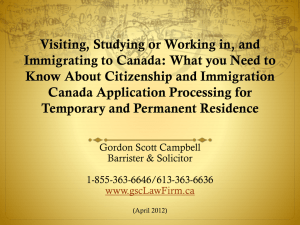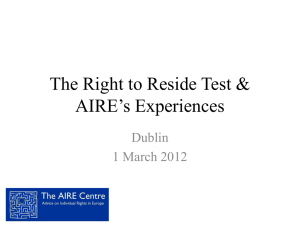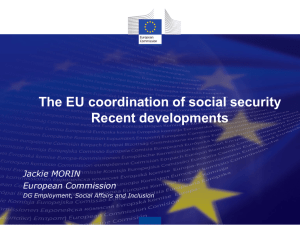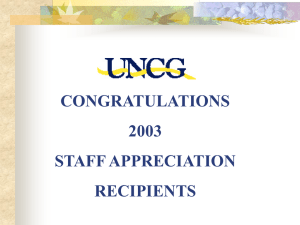Autorizaciones de residencia, estancia por estudios, concesiones
advertisement
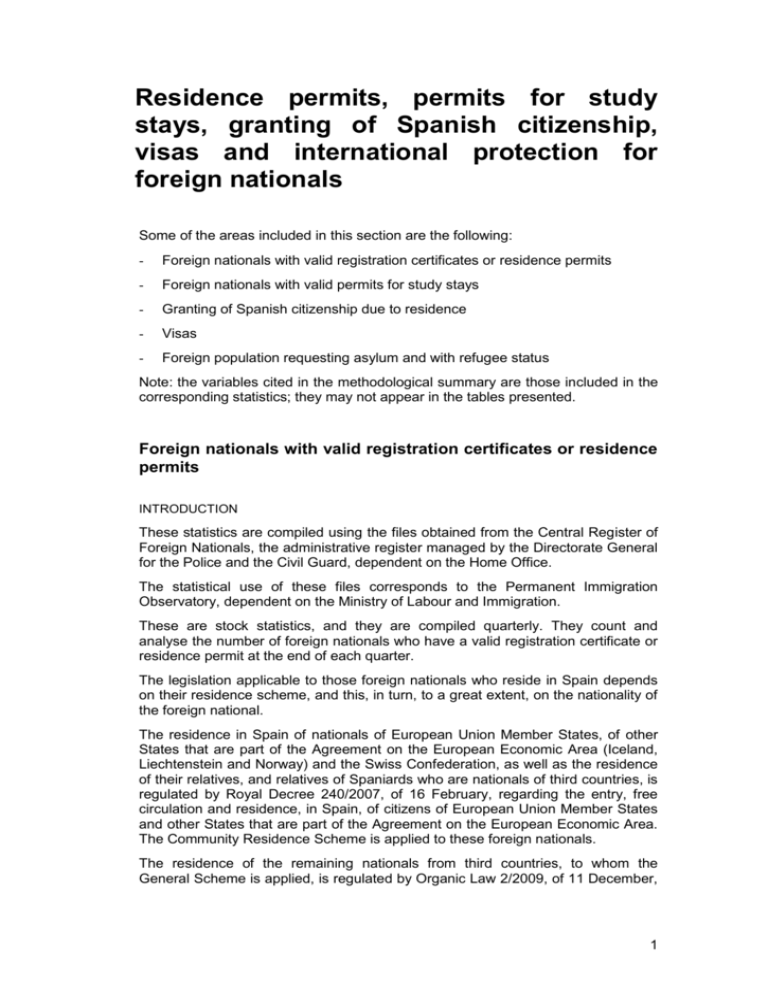
Residence permits, permits for study stays, granting of Spanish citizenship, visas and international protection for foreign nationals Some of the areas included in this section are the following: - Foreign nationals with valid registration certificates or residence permits - Foreign nationals with valid permits for study stays - Granting of Spanish citizenship due to residence - Visas - Foreign population requesting asylum and with refugee status Note: the variables cited in the methodological summary are those included in the corresponding statistics; they may not appear in the tables presented. Foreign nationals with valid registration certificates or residence permits INTRODUCTION These statistics are compiled using the files obtained from the Central Register of Foreign Nationals, the administrative register managed by the Directorate General for the Police and the Civil Guard, dependent on the Home Office. The statistical use of these files corresponds to the Permanent Immigration Observatory, dependent on the Ministry of Labour and Immigration. These are stock statistics, and they are compiled quarterly. They count and analyse the number of foreign nationals who have a valid registration certificate or residence permit at the end of each quarter. The legislation applicable to those foreign nationals who reside in Spain depends on their residence scheme, and this, in turn, to a great extent, on the nationality of the foreign national. The residence in Spain of nationals of European Union Member States, of other States that are part of the Agreement on the European Economic Area (Iceland, Liechtenstein and Norway) and the Swiss Confederation, as well as the residence of their relatives, and relatives of Spaniards who are nationals of third countries, is regulated by Royal Decree 240/2007, of 16 February, regarding the entry, free circulation and residence, in Spain, of citizens of European Union Member States and other States that are part of the Agreement on the European Economic Area. The Community Residence Scheme is applied to these foreign nationals. The residence of the remaining nationals from third countries, to whom the General Scheme is applied, is regulated by Organic Law 2/2009, of 11 December, 1 reforming Organic Law 4/2000, of 11 January, regarding the rights and liberties of foreign nationals in Spain and their social integration. These statistics do not include the following foreign nationals: - Those who are in Spain in a stay situation (maximum duration of 3 months per semester, with the possibility of extension for the same amount of time). - Those who are in Spain with a stay permit for the purpose of undertaking courses, studies, research work or training (whose duration shall be equal to that of the course in which they are enrolled or the research work they are performing). - Those cross-border workers who do not reside in Spain. - Those asylum applicants and those who have obtained the status of refugee or the status of stateless. - Those foreign nationals of the Community Scheme who have not requested their registration in the Central Register of Foreign Nationals, or who have requested it but have not yet obtained the corresponding certificate, as this registration was not compulsory before 2 April 2007. - Those foreign nationals whose residence documentation has expired and is being renewed. OBJECTIVES The objective is to provide information regarding the number of foreign nationals who possess a registration certificate or residence permit, regarding the characteristics of the foreign nationals and of the authorisations that allow them to reside and/or work in Spain. Among the main analysis variables, this studies: Reason for issue and Type: the residence permits of the foreign nationals included in the General Scheme may be classified in the following categories: Temporary residence: Considered to be in a situation of temporary residence is that foreign national who is authorised to remain in Spain for a period of time longer than 90 days and shorter than five years. Within this category, a distinction may be made between: Non-lucrative residence: This allows the foreign national to reside in Spain temporarily, without carrying out labour activities. Family regrouping: Considered to be in a situation of temporary residence due to family regrouping is that foreign national who is authorised to remain in Spain, by virtue of the right to family regrouping exercised by a resident foreign national who has legally resided in Spain for one year and has obtained the authorisation to reside for at least another year. The temporary residence permits, in general, do not grant the right to work. Nevertheless, according to the latest reform, the residence permit due to family regrouping, of which the permit-holders are spouses and children at a working age, shall allow for working without the need for any other administrative process. Exceptional circumstances: These are the residence permits that are granted, under exceptional circumstances, in the cases stated in article 45 of the Regulation on development of the Organic Law on Foreign Nationals: 2 (Settlement. International protection, Humanitarian reasons, Cooperation with the administrative, police, tax or legal authorities, etc.) Temporary residence and work: Considered to be in a situation of temporary residence, with authorisation to work, is that foreign national over 16 years of age, who is authorised to remain in Spain for a period of time longer than 90 days and shorter than five years, and to exercise a lucrative, labour or professional activity, either self-employed or working for others. Within this category, a distinction may be made between: Working for others: The permit for temporary residence and work employed by others allows foreign nationals to develop a labour relationship working for others. This category includes permits for temporary residence and work employed for others, of a determined duration, which allows for the development of certain activities. Also included in this category are those permits for temporary residence and work, within the framework of transnational service provision, which are granted, in the cases included in article 63 of the Regulation on development of the Organic Law on Foreign Nationals, to foreign workers who depend, through a specific labour relationship, on a company established in a State that does not belong to the European Union or the European Economic Area. Likewise, this heading includes those residence permits, with the exception of the work permit, granted for the exercise of certain labour activities, pursuant to article 41 of the Organic Law on Foreign Nationals. Self-employed: The permit for temporary residence and self-employed work allows foreign nationals to carry out an economic activity, self-employed. Long-term residence: Considered to be in a situation of long-term residence is that foreign national who has been authorised to reside in Spain indefinitely, and to work in the same conditions as Spaniards. Foreign nationals with valid permits for study stays INTRODUCTION These statistics are compiled using the files obtained from the Central Register of Foreign Nationals, the administrative register managed by the Directorate General for the Police and the Civil Guard, dependent on the Home Office. The statistical use of these files corresponds to the Permanent Immigration Observatory, dependent on the Ministry of Labour and Immigration. These are stock statistics, and they are compiled quarterly. They count and analyse the number of foreign nationals who have a valid permit for study stays at the end of each quarter. OBJECTIVES The general objective is to provide information regarding the number of foreign nationals with valid permits for study stays at the end of each quarter, and their characteristics. 3 The legislation applicable to those foreign nationals with permits for study stays is also Organic Law 2/2009, of 11 December, reforming Organic Law 11/2000, of 11 January, regarding the rights and liberties of foreign nationals in Spain and their social integration, according to which it is possible to grant a permit for study stays to foreign nationals who wish to perform research work or training that is not paid labour, or to undertake or broaden studies, in any officially recognised, public or private, Spanish educational or scientific centres, and for which they must have the corresponding study visa. Likewise, those foreign nationals who have requested a study visa or who are in Spain with a permit for study stays, may request the corresponding stay visits so that their relatives may legally enter and stay in Spain during the duration of said studies or research, without this demanding a previous stay period of the foreign student or researcher. The type of stay permit may be: - Initial: the duration shall be the same as that of the course for which the person is enrolled, or as may be the case, of the research work s/he is performing. - Renewal: the permit may be renewed when the interested party shows proof: a) that they still fulfil the requirements for obtaining the study visa, and b) that they have passed the corresponding tests or requirements for continuing their studies or, as may be the case, that the research carried out by the foreign national is progressing adequately. Granting of Spanish citizenship due to residence INTRODUCTION These statistics are obtained from an administrative register managed by the Directorate General for Registers and Notaries of the Ministry of Justice. The statistical use corresponds to the permanent Immigration Observatory, dependent on the Ministry of Labour and Immigration. OBJECTIVES The objective is to provide information regarding the number of foreign nationals who access Spanish citizenship due to residence in Spain, in the conditions established in the Civil Code. Spanish citizenship may be acquired by possessing a status (article 18 Cc.), by adoption (article 19 Cc.), by option (article 20 Cc.), by naturalisation card (article 21 Cc.) or by residence (article 22 Cc.). This includes only those cases of acquisition of citizenship by residence in Spain, this being the most common means for foreign nationals. For the acquisition of citizenship due to residence, it is necessary to have resided in Spain legally, continuously and immediately prior to the application, for a period of ten, five, two or one year, depending on the case. Citizenship (or nationality) is defined as the legal bond linking the person with the State, and from which a series of rights and obligations are derived. 4 The following reasons for granting citizenship are analysed: Two years of residence: Granting of Spanish citizenship after two years of residence. Ten years of residence: Granting of Spanish citizenship after ten years of residence. Born in Spain: Within those accessing Spanish citizenship after one year of residence, this makes a distinction for the specific case of persons born in Spain. Married to a Spaniard: Within those acquiring Spanish citizenship after one year of residence, this makes a distinction for the case of spouses of Spaniards. Child or Grandchild of a person of Spanish origin: Within those acquiring Spanish citizenship after one year of residence, this makes a distinction for the case of descendents of Spaniards. Other reasons: This includes all those remaining cases of acquisition of Spanish citizenship after one year of residence, and the case of those who have obtained the status of refugee. Visas INTRODUCTION These statistics are obtained from an administrative register managed by the Subdirectorate General for Affairs of Foreign Nationals, of the Directorate General of Consular Affairs and Assistance, belonging to the Ministry of Foreign Affairs and Cooperation. The statistical use corresponds to the Permanent Immigration Observatory, dependent on the Ministry of Labour and Immigration. It offers information regarding the visas issued during the indicated year. The visa is issued in the Spanish Diplomatic Mission or Consular Office corresponding to the nationality or legal residence of the applicant, at her/his request. The visas issued during a given year may have been requested the previous year. Those foreign nationals who intend to enter Spanish territory must do so with the corresponding visa, correctly issued and still valid, except in the following cases: - For stays of up to 3 months, in a period of 6 months, or for transfers of less than 5 days, they shall not need a visa: o Nationals of countries with whom their suppression has been agreed, in the form and conditions established in the corresponding agreement. o Those foreign nationals who have the condition of refugees and who are documented as such by a country signatory of European Agreement 31, of 20 April 1959, regarding the exemption of visas for refugees. o Those members of foreign passenger and trade boat crews, when they are documented with a valid seafarer identity document, and only during the stopover of the boat or when it is in transit to embark towards another country. o Those members of foreign commercial airplane crews, who are documented as such with a crew member card, during the stopover of their aircraft or 5 between two stopovers of consecutive scheduled flights of the same airline to which the aircraft belongs. o Those foreign nationals who have a residence permit, a provisional residence permit or a diplomatic accreditation card, issued by the authorities of another State with which Spain has an international agreement signed that considers this possibility. These authorisations must have a minimum validity equal to the stay period, or to the duration of the transfer, foreseen at the time of requesting entry. Not requiring a visa to enter Spanish territory are those foreign nationals with a foreign national identity card, a foreign student card, a diplomatic accreditation card or a return authorisation, foreseen in article 18 of the Regulation of Organic Law 4/2000, of 11 January, regarding the rights and liberties of foreign nationals in Spain and their social integration, or those persons with a cross-border worker card with regard to the entry into Spanish territory that forms a border with the country of the worker, so long as the authorisations that said documents prove have been issued by the Spanish authorities and are valid at the time of requesting entry. Regarding visa demands, Spain follows the guidelines of the European Union, which has compiled a common listing establishing the third party countries whose nationals are obligated to present a visa upon entry into any Member State. VARIABLES Nationality: this includes the country of nationality of the foreign national. Type of Visa: - - Transit: considered to be in transit are those foreign nationals permitted to cross the Schengen Area in travelling between one Third state towards another State that admits said foreign national or allows her/him to remain in the international transit zone of a Spanish airport without accessing the national territory, during stopovers or flight connections. These visas allow for transiting once, twice, or exceptionally, several times. They are classified as follows: Airport transit visa: allowing that foreign national specifically subject to this requirement to remain in the international transit area of a Spanish airport, without accessing the national territory, during stopovers or flight connections. Territorial transit visa: allowing the foreign national to cross Spanish territory on a trip, no longer than five days, from a third State to another that admits said foreign national. Stay: this is the situation of that foreign national who does not have a residence permit, and who is authorised to stay in Spain for an uninterrupted period of time, or sum of subsequent periods of time, whose total duration does not exceed ninety days per semester, beginning with the date of first entry, notwithstanding that which is set out for students or researchers and their families. According to the purpose of the visa, a distinction is made between: 6 - General stay visa: those stays with tourist or similar purposes. This includes visas for multiple entries/departures. Visa for relatives of community nationals. Work visa: This includes stay visas relating to the exceptions of work permits and to those seasonal and contingent visas of a duration of up to 90 days. Residence: the situation of that foreign national who is in Spain and has authorisation to reside, which may be temporary or long-term. Also possessing this type of visa are those foreign nationals with study stay permits, which are granted to foreign nationals who wish to carry out research work or training that is not paid labour, or to undertake or extend their studies, in any officially recognised public or private Spanish educational or scientific centres. According to the purpose of the visa, a distinction is made between: Visa for family regrouping. Residence visa without a labour purpose: this allows for residing in Spain without carrying out labour or professional activities. Work and residence visa: this allows for carrying out a labour or professional activity, working for others or self-employed. Study visa: this allows for remaining in Spain to undertake courses, studies, research work or training. Place where the visa is issued: Country of the Diplomatic Mission or Consular Office that issues the visa. This is provided in two different groupings: one that provides the countries by geographical area, and another more simplified one, with the following categories: Country of nationality, Another country from the same continent and Another continent. Foreign population requesting asylum INTRODUCTION The original source of this data is the Subdirectorate General for Asylum (Asylum and Refuge Office), of the Directorate General of Internal Policy belonging to the Home Office. The right to asylum recognised in article 13.4 of the Spanish Constitution is the protection granted to those foreign nationals for whom the condition of refugee is recognised, and it consists of neither returning them nor expelling them, in the terms of article 33 of the Convention on the Refugee Statute drawn up in Geneva on 28 July 1951, and in the adoption of the following measures during the time in which the circumstances causing the granting of the right to asylum subsist: o Granting of authorisation to reside in Spain. o Issue of the necessary travel and identity documents. o Authorisation to carry out labour, professional or mercantile activities. o Any others that may be included in the international Agreements referring to refugees signed by Spain. 7 Applicants for asylum, until a decision is obtained regarding their request, are protected from being returned or expelled from Spanish territory. Information is offered regarding asylum requests and resolutions taken. Applicants: o o o Autonomous Community of presentation of the request. Continent and nationality alleged by the applicant. Sex. Resolutions: o Type of resolution: within this variable, the category called "unfavourable." refers to those requests that were admitted to processing, and that were subsequently resolved unfavourably. In turn, the category of "subsidiary protection" encompasses those that, even without recognising the refugee status of the applicant, authorises her/him to remain in Spain because the return to her/his country of origin would imply a real risk to her/his life or physical integrity. o Continent and nationality of the applicant. 8

